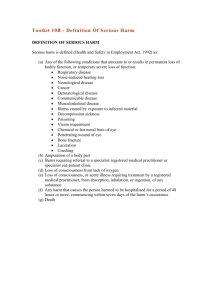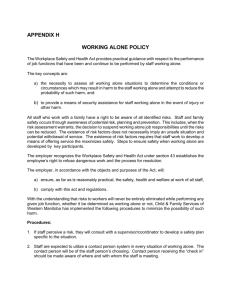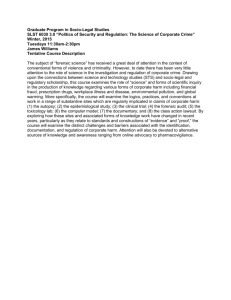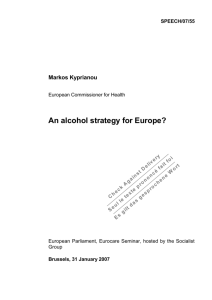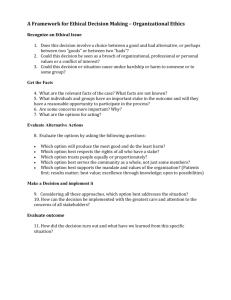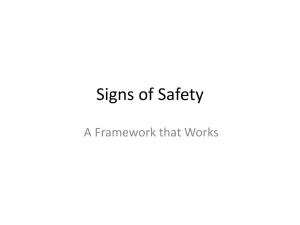Speech - Eurocare
advertisement
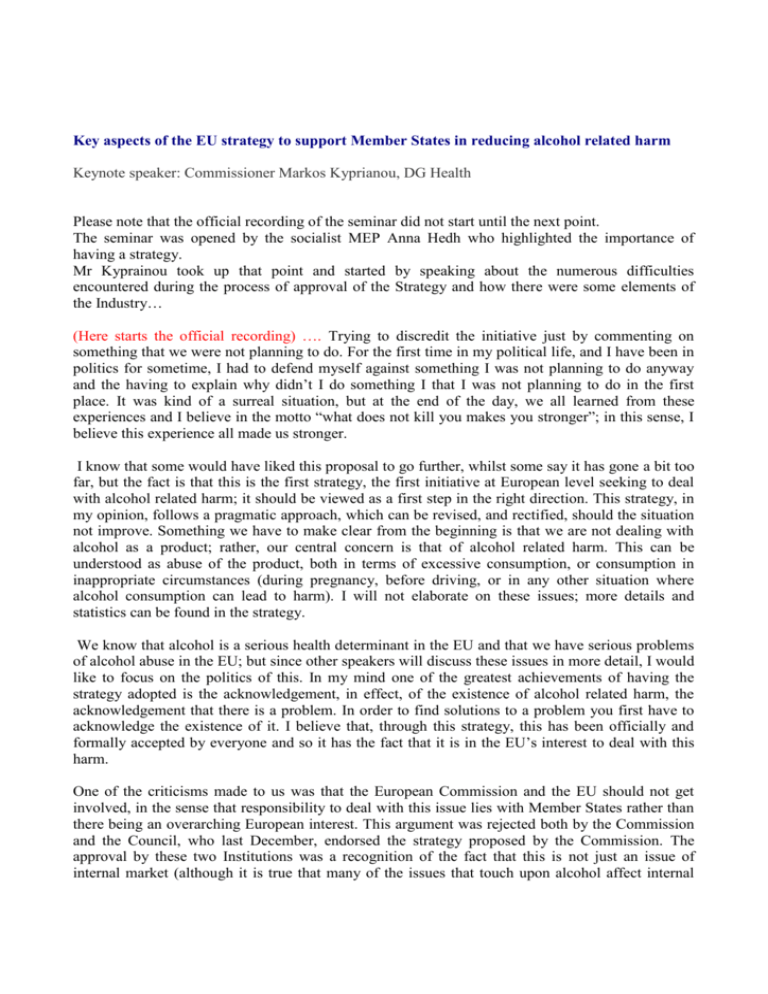
Key aspects of the EU strategy to support Member States in reducing alcohol related harm Keynote speaker: Commissioner Markos Kyprianou, DG Health Please note that the official recording of the seminar did not start until the next point. The seminar was opened by the socialist MEP Anna Hedh who highlighted the importance of having a strategy. Mr Kyprainou took up that point and started by speaking about the numerous difficulties encountered during the process of approval of the Strategy and how there were some elements of the Industry… (Here starts the official recording) …. Trying to discredit the initiative just by commenting on something that we were not planning to do. For the first time in my political life, and I have been in politics for sometime, I had to defend myself against something I was not planning to do anyway and the having to explain why didn’t I do something I that I was not planning to do in the first place. It was kind of a surreal situation, but at the end of the day, we all learned from these experiences and I believe in the motto “what does not kill you makes you stronger”; in this sense, I believe this experience all made us stronger. I know that some would have liked this proposal to go further, whilst some say it has gone a bit too far, but the fact is that this is the first strategy, the first initiative at European level seeking to deal with alcohol related harm; it should be viewed as a first step in the right direction. This strategy, in my opinion, follows a pragmatic approach, which can be revised, and rectified, should the situation not improve. Something we have to make clear from the beginning is that we are not dealing with alcohol as a product; rather, our central concern is that of alcohol related harm. This can be understood as abuse of the product, both in terms of excessive consumption, or consumption in inappropriate circumstances (during pregnancy, before driving, or in any other situation where alcohol consumption can lead to harm). I will not elaborate on these issues; more details and statistics can be found in the strategy. We know that alcohol is a serious health determinant in the EU and that we have serious problems of alcohol abuse in the EU; but since other speakers will discuss these issues in more detail, I would like to focus on the politics of this. In my mind one of the greatest achievements of having the strategy adopted is the acknowledgement, in effect, of the existence of alcohol related harm, the acknowledgement that there is a problem. In order to find solutions to a problem you first have to acknowledge the existence of it. I believe that, through this strategy, this has been officially and formally accepted by everyone and so it has the fact that it is in the EU’s interest to deal with this harm. One of the criticisms made to us was that the European Commission and the EU should not get involved, in the sense that responsibility to deal with this issue lies with Member States rather than there being an overarching European interest. This argument was rejected both by the Commission and the Council, who last December, endorsed the strategy proposed by the Commission. The approval by these two Institutions was a recognition of the fact that this is not just an issue of internal market (although it is true that many of the issues that touch upon alcohol affect internal market issues as well) and of the fact that DG SANCO has the clear remit, dealing with health in the EU, to promote strategies in this area. In my view, this strategy represents a milestone. Maybe some of you here would have wanted the strategy to be more ambitious, and include more concrete proposals; but we should not ignore the significance of this strategy, the first to deal with alcohol related harm at Community level, which, among other things, creates political pressure on those Member States that were not willing to take action in this area to do so. I can assure you that if you look at the detail of the strategy, you will see that everything that matters, all the issues of concern, are included in the proposal. There was a consensus from the beginning that there was no intention at this point to proceed with binding legislation (in the areas where the EU is competent). All the issues that are important, and have to be discussed and reflected upon by Member States and that can become action or strategies of Member States, are included in the strategy. There may have been amendments in the wording of these, or alterations in the presentation, but more importantly, the ‘substance’ is there. All the important issues, even the more controversial ones, are included within this strategy, which testifies of the overarching European interest in this area. This is a first strategy, a first step to form a common approach at European level. But this is also a pragmatic strategy; given the difficulties of legislating at EU level, this is a tentative approach to attempt to deal with the pressing problem of alcohol related harm. This approach consists of, in effect, the implementation of guidelines and voluntary commitments on the part of the Member States; an exchange of best practices (the importance of such an initiative should not be underestimated) and the collection of data and information on which we can base further actions; and finally, voluntary codes of conduct and self-regulation for the alcohol industry. The exchange of best practices among Member States is very important as it seems that throughout the EU, Member States individually are taking action to combat certain aspects of alcohol related harm. It is important to make sure that Member States communicate among themselves, and coordinate actions, learning from each other experiences, both in terms of positive and effective measures and actions, as well as less successful ones. As mentioned before, this is the first step, and if this approach does not deliver certain results, we may have to review our initial approach, and make more binding proposals. As you may have realised, I have not been reading the speech I had prepared; you have experts speaking to you today about the harm done by alcohol, and you are all familiar with the debates surrounding these issues, so I thought it would be more interesting to present the politics behind the strategy as well as outline our views and visions. The Communication singles out five priority areas. - The protection of young people, children and the unborn child The main priority of the strategy are young people, by which I mean not only young people as consumers but also children; we want to protect the unborn child from the mother’s alcohol consumption during pregnancy as well as protect children living in families with alcohol problems. - Reduce injuries and death from alcohol-related road accidents The toll of road accidents and deaths from alcohol related road accidents have taken dramatic dimensions all over Europe. - Prevent alcohol-related harm among adults and reduce the negative impact on the workplace - Inform, educate and raise awareness on the impact of harmful and hazardous alcohol consumption, and on appropriate consumption patterns We will be targeting the sales of alcohol to underage people and want to promote responsible retailing; establishments have a social responsibility not to serve alcohol to intoxicated customers. But all of these measures will only become effective if we manage to raise the level of awareness and educate consumers, which is why this strand of the strategy is so important. - Develop and maintain a common evidence base at EU level Evidently, we cannot achieve this alone, and in terms of the implementation of the strategy, we are very much relying on continued support from the NGOs. But of course, we also need the commitment of other stakeholders: the alcohol industry, the retailers, the advertising industry, the media and many more stakeholders; all need to be part of the solution – since they are part of the problem, after all, and have already expressed their willingness to work with us. In an attempt to bring everybody together we are setting up the Alcohol and Health forum, which is modeled on the Obesity Platform. We are working hard to make it possible for the first meeting of the Forum to take place in June. The forum will be provide a platform for all stakeholders, and we will make sure that all express commitments to contribute to solving the growing problem of alcohol related harm. We will also be relying on the work done by Member States in the implementation of the strategy, as well as the support from other European Institutions in this process. The Council has already unanimously welcomed the Strategy and the European Parliament, the Committee of the Regions and the Economic and Social Committee are presently preparing their reports on the Communication. The rest of the stakeholders as well as the NGOs form a very important element, not only in order to balance the presence and participation of the industry in this forum, but also because they work more closely with citizens and consumers; this means that many of the actions will be better implemented with the help and the assistance of the NGOs. A very important issue is that of alcohol marketing and advertising; we are still considering whether there will be a separate working group that will deal with this issue or if it is to be tackled within the framework of the Forum. This issue is very tricky and in fact, more complicated than that of the targeting of advertising of “junk food” to children. In the case of “junk food”, adverts clearly directed at children can be controlled. But in the case of alcohol advertising the problem is that young people drink to mimic the behaviour of adults, and therefore there exist no cartoons advertising whisky or vodka. In this sense, the issue of the increasing sophistication of the marketing of alcohol products may require a separate, dedicated working group It is very important that excessive alcohol consumption and drunkenness are not “glorified” in the advertisements or in films, as we know that this is one of the factors influencing the behaviour of young people. There is an increasing trend towards binge drinking among young people all over Europe. This is not only a problem occurring in northern European countries though; Spain for example has a serious problem of youth binge drinking and this is spreading to other countries as well. For once, we should take timely preventative action in the EU, rather than simply adopting a reactive approach to the problem. In my opinion, the film industry also has a role to play at the heart of this debate, and we will try and work with various organizations within this field. I will stop here. I am looking forward to receiving the report of the Parliament on this issue, which is a very important one for us. It is vital that we have the three Institutions on board: The Commission adopted the proposal, the Council endorsed it and I hope the Parliament will take a similar approach, following which, we will able to fully proceed with its implementation. I am also encouraged by some individual resolutions that refer to this issue in different contexts. I am quite optimistic that now that the work has started, we will be able to deliver results; if this does not work, we will come back with more binding proposals. But I hope that everyone has received the message, everyone has accepted the message and everybody will be committed to deliver and achieve the expected results and outcomes. Thank you very much for you attention.

